Rod Miller's Blog, page 18
June 3, 2019
Celebrating art.

From June 20 through 23, hundreds of artists of all kinds invade downtown Salt Lake City’s Library Square for the Utah Arts Festival. And tens of thousands of lovers of literature, music, visual arts, dance, and other artistic endeavors join the fun. This year, cowboy poets and Western writers are on the program, including yours truly. I am honored to have been asked to present a workshop on Western writing and take the stage to read from my work. Should you live in or find yourself in the Intermountain West while the celebration is in progress, join us. There’s something for everyone on the program—especially something you never expected.

Published on June 03, 2019 07:51
May 24, 2019
And the envelope, please…
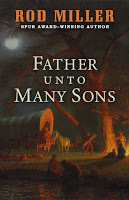
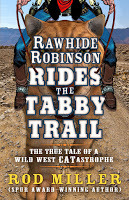 Western Fictioneersrecently announced the Finalists for the annual Peacemaker Awards (named for Sam Colt’s famous revolver that some say won the West) for Western fiction published in 2018.
Western Fictioneersrecently announced the Finalists for the annual Peacemaker Awards (named for Sam Colt’s famous revolver that some say won the West) for Western fiction published in 2018.I am tickled pink to say that Father unto Many Sons is among the candidates for Best Novel, and Rawhide Robinson Rides a Dromedary: The True Tale of a Wild West Camel Caballero is on the list for Best Young Adult or Children’s Fiction. (This book, you may recall, will also be recognized as a Finalist for the Western Writers of America Spur Award.)The winners will be announced mid-June. But, if neither novel tops the Western Fictioneer charts, it is still an honor to make the short list.Sometimes you get lucky.
Published on May 24, 2019 08:07
May 13, 2019
Eat what you like, like what you eat.
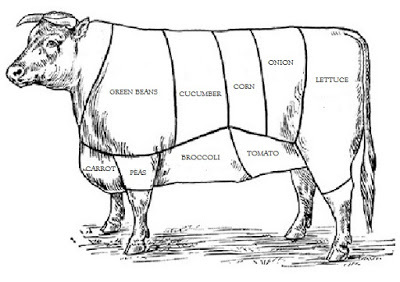
Lately I have seen advertisements for a new kind of “meat.” Except it isn’t meat at all, it’s “plant-based protein.”Now, I have nothing against vegetarians or vegans or anyone else who chooses not to eat meat. But I cannot fathom why people who don’t want to eat meat want to pretend they are eating meat. Over the years, alchemists in laboratories have invested tons of time and money attempting to turn plants into something resembling meat. Why?If it’s meat you crave, it’s not hard to find. Cattle and pigs and sheep and chickens and other animals have been making it naturally for time immemorial. And those of us who choose to eat the stuff do not waste time or energy trying to make meat look or taste like carrots, cabbage, corn, cauliflower, collards, cucumbers, kale, quinoa, or any other plant. We eat our meat and we eat our vegetables as nature intended.Imitation meat?Some things simply escape me.
Published on May 13, 2019 09:55
May 5, 2019
A wedding celebration.
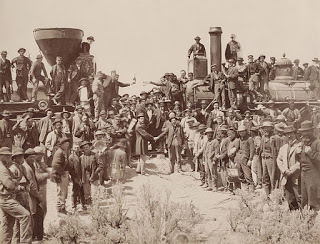
On May 10, America celebrates one of the greatest engineering achievements in human history—the completion of the (sort of) transcontinental railroad. The historic 1869 event at Promontory Summit (often reported incorrectly as Promontory Point, an altogether different place) drew a crowd of somewhere between 500 and 3,000 people. The 150th anniversary celebration at the windswept Golden Spike National Historic Park will likely draw many more. Museums and libraries and other places around greater northern Utah have been and will continue to offer exhibits and other commemorative activities.Despite all the dire consequences associated with the building of the railroad—further displacement of native tribes, destruction of wildlife, abuse of workers, creation of a new class of robber barons, and the many financial improprieties involved—the driving of the golden spike marking the completion of the railroad hastened the settlement and economic development of the West and helped bind the sprawling nation together.It’s a day worth remembering. So, celebrate the wedding of the rails—or mourn, if you must.
Published on May 05, 2019 16:08
April 29, 2019
Lies They Tell Writers, Part 49: Look for the Next Big Thing.

The popularity of kinds and categories of books tends to come in waves. Time was, America was enamored with the Old West. (And why not? The story of westward expansion is the story of our country.) Nowadays, that has waned. Oh, there are still plenty of books published about the West, and there always will be. But they do not command the share of the market they once did.For a time, Science Fiction was all the rage, and writers were tripping all over themselves to write that stuff. And Science Fiction spawned a lot of interest in Fantasy. Fantasy is still popular in all its types and kinds, but Science Fiction isn’t as prevalent as it once was.Romance novels had their days in the sun as well, and while they continue in popularity, there are not as many as there used to be, and entire categories of romance have all but disappeared.Mysteries have always been popular, but they wax and wane as well, along with shifts in the kinds of mysteries that are selling like hotcakes. And there are crime novels, police procedurals, private-eye novels, political thrillers, spy novels, and so on. Agents and publishers and others sometimes encourage aspiring and even accomplished authors to climb aboard the current bandwagon; to write something in the genre that’s popular this year.Trouble is, those writers may not be drawn to the category and, as a result, what they write is uninspired, formulaic, or just plain bad. And, by the time the book gets to market, tastes have changed, that parade has already passed, and “the next big thing” isn’t so much of a thing anymore.The thing to do, many writing gurus will tell you—and I tend to agree—is to write the kind of book you want to write and hope for the best. It may not make you rich, but the odds aren’t that much different. And at least you will have enjoyed the writing of it.
Published on April 29, 2019 06:30
April 20, 2019
Guys with Guitars.
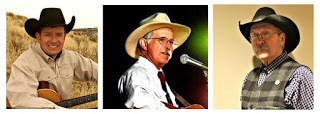
For years, we have taken advantage of opportunities to attend performances by three of the best writers and singers of cowboy songs the West has produced. Ever.Brenn Hill, Dave Stamey, and DW Groethe have long been favorites, and they become more so every time we see or hear them finger the frets and vibrate their vocal cords. We’ve heard them with various forms of accompaniment, from side men to backup bands, all the way up to an orchestra. Given enough such enhancement, most anyone (save the likes of me) can sound presentable on stage or in a recording. But give a cowboy nothing more than a guitar and a microphone and you’ll soon hear what he’s got. And that’s where Brenn Hill and Dave Stamey and DW Groethe stand out—standing behind a guitar and a microphone on an otherwise empty stage. While each has a different style of string bending, each is a master at making those six strings resound. There is variety in their vocals as well, but each offers a rich, strong voice with plenty of range and dynamics and all those other things singers have.But their real mastery, I believe, is in their songwriting. From the Old West to the new, from stories from history to deeply personal musings, they set life to music in ways poets envy and audiences enjoy. If and when you find any of these cowboys appearing anywhere in your part of the country, buy a ticket. Your ears will enjoy the experience.
Published on April 20, 2019 06:34
April 10, 2019
Really Stupid Words, Chapter 6

American English is a rich language. It changes and evolves, and words and usages come and go. Some clarify, improve, enhance, and enrich. But some are just plain stupid. They obfuscate, they complicate, they confuse. They don’t mean what they say, or say what they mean. And they shoulder aside more appropriate words.One such word that has become ubiquitous over the past couple of decades is “awesome.”Now, “awesome” is a fine word with a very specific meaning. It describes something that causes or induces awe; that inspires an overwhelming feeling of reverence, admiration, or fear. Its roots lie in “awe,” a condition produced by that which is grand, sublime, extremely powerful, or the like.But we toss “awesome” around in conversation to apply to anything and everything we deem even mildly pleasant or agreeable. Stupid.On the other hand, misuse of “awesome” has served to diminish the use of “cool” and “incredible”—two likewise useless abuses of language. And I suppose some would describe that eventuality as “awesome.”
Published on April 10, 2019 06:14
April 1, 2019
A fond, but frightened, farewell.

While researching a forthcoming novel, A Thousand Dead Horses, based on historic horse-stealing in California, I inadvertently discovered a conspiracy whose tentacles continue to affect equine commerce to this day. The FBI and federal prosecutors discourage my revealing too much, so I will only say the criminal organizations(s) descended from the original cabal are behind numerous scandals in the Thoroughbred horse-racing community throughout the twentieth century, including the 2002 Breeders Cup betting affair, doping by Godolphin Stables, even reaching across the sea to Australia’s Fine Cotton scandal. Illegalities are still rampant, with suspicions (based on considerable evidence) that these criminal organizations are behind (or at least involved in) the present difficulties at California’s venerable Santa Anita racetrack. I can say nothing more without endangering ongoing investigations by the Department of Justice and the attorneys general of several states. My research, they believe, which landed me in the middle of this muddle, has put me in danger and, owing to threats received, I am inclined to believe I have been targeted.As a result, the United States Marshal Service has enrolled me in the witness protection program. As part of leaving my past life behind, “writer Rod Miller” becomes a mere footnote in history. I appreciate each of you, my readers, and hope this nightmare ends in th
Published on April 01, 2019 05:16
March 22, 2019
My Favorite Book, Part 19.
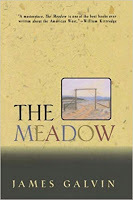
It would be nigh on impossible for me, or any other voracious reader, to identify a lone, single, sole book as the one and only all-time favorite. There are simply too many wonderful reads, and, depending on time and place and emotional state and who knows how many other contributing factors, books can mean something different to a reader with each re-read. But if you backed me into a corner, one book that would certainly clamor for the place at the top of the pile is The Meadow by James Galvin. There are many, many reasons I admire The Meadow. And, for just as many reasons, it’s a difficult book to put your finger on. It is, in part, a memoir of sorts, recounting aspects of the author’s experiences. It is part natural history, providing much detail about landscape and seasons and wildlife. Some of it is history, painting a picture of people and places over the course of 100 years. It is a biography, in a way, focusing on the life of one character in great detail, and telling the life stories of a number of other characters. It is fiction to some degree, as Galvin writes dialogue and puts words in people’s mouths that, while they may reflect truth, he could not have heard. The publisher categorizes The Meadow simply as “literature.”As simply as I can put it, the book tells a century-long story of a mountain meadow and the surrounding countryside in the high country along the Wyoming and Colorado border south of Laramie. But—and this is one characteristic that I particularly like—it does not tell the story chronologically. Nor does it do so using the normal format of chapters. Rather, the story is told in short bursts, with some entries (for lack of a better word) only a few sentences long, and with none occupying more than a few pages. Interspersed are extracts from the actual diaries of a couple of characters. I sometimes describe the book as a series of “snapshots”; vivid images captured to illuminate people and places and events.Then, it as if the author took his stack of snapshots and tossed them into the air, gathered them up at random, and used that arrangement in the book. You will read a page about something that happened last week, turn the page and find yourself immersed in something that happened fifty years ago, turn another page to witness events of a decade ago, read on the next page something from a century ago, or perhaps last month, or some other time.As you page through the images, a bigger picture forms, tying all the people and places into one, big, fascinating story. Finally, James Galvin is a poet. Which means he uses language beautifully. It’s a pleasure to read, and a reminder that writing—real writing—is more than storytelling. I can’t say how many times I have read The Meadow. A dozen, perhaps. Maybe twenty. I think I’ll pull it off the shelf and read it again.
Published on March 22, 2019 05:03
March 13, 2019
Singing for Spurs.
[image error]
“And the River Ran Red,” a song by Brenn Hill with lyrics from my poem, has been the subject of more than one of these discourses. It is most likely an ego trip, but it could be sheer excitement at hearing my words set to music in such a moving song. Whatever the reason, I am not the only one enamored with the song. Western Writers of America recently selected it as a Spur Award Finalist. Which means, in the opinion of the judges, “And the River Ran Red” is one of the two or three best songs about the American West released last year. All credit for the achievement goes to Brenn and his stellar talents as a composer and singer and music producer.Still, I will hang my copy of the award certificate on the wall.
[image error]
“And the River Ran Red,” a song by Brenn Hill with lyrics from my poem, has been the subject of more than one of these discourses. It is most likely an ego trip, but it could be sheer excitement at hearing my words set to music in such a moving song. Whatever the reason, I am not the only one enamored with the song. Western Writers of America recently selected it as a Spur Award Finalist. Which means, in the opinion of the judges, “And the River Ran Red” is one of the two or three best songs about the American West released last year. All credit for the achievement goes to Brenn and his stellar talents as a composer and singer and music producer.Still, I will hang my copy of the award certificate on the wall.
[image error]
Published on March 13, 2019 09:48



